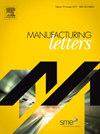Local formability improvement of 6111-T6 aluminum alloy sheet through high-speed robotic friction stir processing
IF 2
Q3 ENGINEERING, MANUFACTURING
引用次数: 0
Abstract
This study examines the impact of friction stir processing (FSP) on the local formability of 6111-T6 aluminum alloy sheets, utilizing sub-scale tensile and VDA bend tests, along with electron microscopy for microstructural analysis. Results show that FSP notably increased uniform and total elongation by 100% and 50%, respectively, though it reduced yield and ultimate tensile strength. Electron backscatter diffraction revealed significant deformation within shear bands and varied fracture paths: intergranular for FSP due to increased grain boundary density and a mix for T6. FSP’s grain refinement facilitated plastic deformation at crack tip leading to blunting and enhanced fracture toughness thus improved bend properties.
6111-T6铝合金板材高速机器人搅拌摩擦加工的局部成形性改善
本研究考察了搅拌摩擦处理(FSP)对6111-T6铝合金板材局部成形性的影响,利用亚尺度拉伸和VDA弯曲试验,以及电子显微镜进行微观结构分析。结果表明,FSP显著提高了均匀伸长率和总伸长率,分别提高了100%和50%,但降低了屈服强度和极限拉伸强度。电子背散射衍射显示剪切带内有明显的变形和不同的断裂路径:由于晶界密度增加,FSP呈晶间断裂,T6呈混合断裂。FSP的晶粒细化促进了裂纹尖端的塑性变形,导致钝化和断裂韧性增强,从而改善了弯曲性能。
本文章由计算机程序翻译,如有差异,请以英文原文为准。
求助全文
约1分钟内获得全文
求助全文
来源期刊

Manufacturing Letters
Engineering-Industrial and Manufacturing Engineering
CiteScore
4.20
自引率
5.10%
发文量
192
审稿时长
60 days
 求助内容:
求助内容: 应助结果提醒方式:
应助结果提醒方式:


